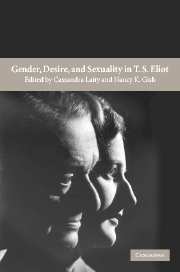Book contents
- Frontmatter
- Contents
- Acknowledgments
- Notes on contributors
- Introduction: Eliot, gender, and modernity
- Part I HOMOEROTICISMS
- Part II DESIRE
- Part III MODERN WOMEN
- Chapter 8 Through schoolhouse windows: women, the academy, and T. S. Eliot
- Chapter 9 T. S. Eliot speaks the body: the privileging of female discourse in Murder in the Cathedral and The Cocktail Party
- Chapter 10 T. S. Eliot, women, and democracy
- Chapter 11 Vipers, viragos, and spiritual rebels: women in T. S. Eliot's Christian society plays
- Index
Chapter 11 - Vipers, viragos, and spiritual rebels: women in T. S. Eliot's Christian society plays
Published online by Cambridge University Press: 22 September 2009
- Frontmatter
- Contents
- Acknowledgments
- Notes on contributors
- Introduction: Eliot, gender, and modernity
- Part I HOMOEROTICISMS
- Part II DESIRE
- Part III MODERN WOMEN
- Chapter 8 Through schoolhouse windows: women, the academy, and T. S. Eliot
- Chapter 9 T. S. Eliot speaks the body: the privileging of female discourse in Murder in the Cathedral and The Cocktail Party
- Chapter 10 T. S. Eliot, women, and democracy
- Chapter 11 Vipers, viragos, and spiritual rebels: women in T. S. Eliot's Christian society plays
- Index
Summary
A cursory glance at the female characters in T. S. Eliot's later plays leaves one with the disconsolate impression that they were modeled, not on living women, but on stock figures of female neurosis and maternal excess popularized in Philip Wylie's misogynist bestseller Generation of Vipers (1942). Presiding over the conventional world of the English drawing room and invested with the stereotypic identities of dominating matron, discontented wife, hardened spinster, and poor cousin, they inhabit a world seemingly untouched by the social and political eruptions of the time, from women's suffrage to war, whose impact on the lives of women and men had been trenchantly analyzed by Eliot's friend Virginia Woolf. In contrast to such flat characterization, however, is the startling fact that many of these female characters undertake crucial tasks in the protagonists' spiritual transformation, functioning as intercessors, spiritual guides, and stern priestesses. Thus Eliot's women lead double lives: on the naturalist surface of the plays, they are custodians of a world of stifling civility and banality, whose pretensions to social authority are comically exaggerated or farcically dismissed; in the symbolic subpattern of the plays, they emerge as pursuing and hieratic figures representing the disruptive claims of a higher spiritual reality, to which only the elect few find access.
- Type
- Chapter
- Information
- Gender, Desire, and Sexuality in T. S. Eliot , pp. 234 - 253Publisher: Cambridge University PressPrint publication year: 2004
- 1
- Cited by



